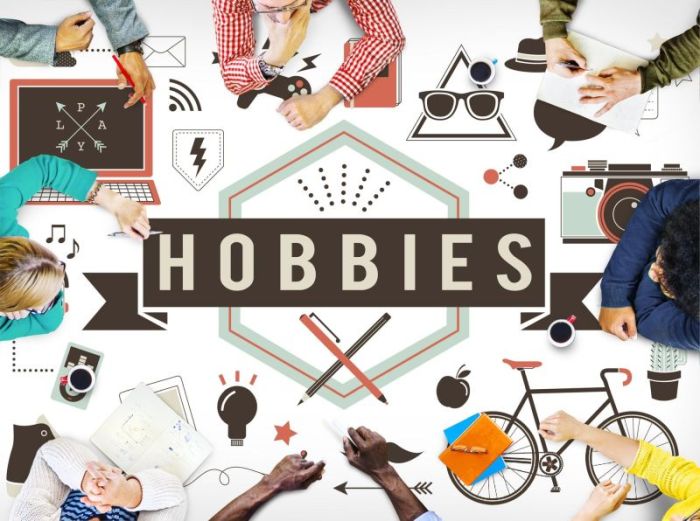Hobby People represent a diverse and fascinating segment of society, united by their dedication to pursuits beyond the professional sphere. From meticulous model railroading to exhilarating extreme sports, the spectrum of hobbies is vast, reflecting a wide array of personalities, commitment levels, and skill sets. This exploration delves into the multifaceted world of hobbyists, examining their social impact, economic contributions, and the profound influence hobbies exert on personal growth.
This examination considers the intricate relationship between hobbies and community building, both online and offline. We’ll analyze the economic ripple effects of hobbyist spending and explore the potential for hobbies to generate income. Finally, we’ll project how technological advancements might reshape the hobby landscape in the coming years, highlighting both opportunities and challenges.
The Social Impact of Hobbies: Hobby People

Hobbies play a crucial role in fostering social connections and enriching lives, extending far beyond mere leisure activities. They serve as powerful catalysts for community building, offering individuals opportunities to interact with like-minded people, share experiences, and cultivate meaningful relationships. This social aspect of hobbies contributes significantly to overall well-being, impacting both mental and physical health.
Hobby-Based Community Formation, Hobby People
Hobbies frequently act as the foundation for vibrant communities, both online and offline. Shared interests provide a common ground for connection, allowing individuals to transcend geographical boundaries and build relationships based on mutual passion. Offline communities might include local knitting circles, model railroading clubs, or volunteer groups focused on a specific hobby like gardening or restoring classic cars. These groups provide opportunities for face-to-face interaction, skill-sharing, and the development of strong social bonds.
The sense of belonging fostered within these groups can be particularly powerful in combating loneliness and isolation.
Online Hobby Communities
The digital age has dramatically expanded the reach and accessibility of hobby-related social interaction. Online forums, social media groups, and dedicated websites devoted to specific hobbies provide platforms for individuals worldwide to connect and share their passions. For example, online communities centered around gaming, coding, or creative writing offer spaces for collaboration, feedback, and the development of lasting friendships.
These online spaces often facilitate a sense of community that transcends physical location, allowing individuals to connect with others who share their interests, regardless of their geographical proximity. The ease of access and constant availability of these platforms have broadened the potential for social interaction related to hobbies, particularly benefiting individuals who may face barriers to participating in offline communities.
Benefits of Hobby-Related Social Interaction
The social aspects of hobbies yield considerable benefits for mental and physical well-being. Participation in hobby-related groups reduces feelings of isolation and loneliness, fostering a sense of belonging and purpose. The shared experiences and collaborative nature of many hobbies can boost self-esteem and confidence. Furthermore, the social interaction associated with hobbies often encourages physical activity, whether it’s through team sports, hiking clubs, or dance classes.
This increased physical activity contributes to improved cardiovascular health, reduced stress, and better overall physical fitness. The positive social interactions also help reduce stress hormones and improve mood, contributing to better mental health outcomes.
Positive Social Impacts of Hobbies
The positive social impacts of hobbies are numerous and far-reaching. The following points highlight key benefits:
- Increased social interaction and reduced feelings of loneliness and isolation.
- Development of strong social bonds and friendships based on shared interests.
- Enhanced self-esteem and confidence through participation and collaboration.
- Improved mental well-being through stress reduction and mood elevation.
- Increased physical activity and improved physical health in many cases.
- Opportunities for skill-sharing and mutual learning within the community.
- Creation of a sense of belonging and purpose.
- Development of leadership and teamwork skills through group participation.
Economic Aspects of Hobbies

Hobbies, often viewed as leisure activities, contribute significantly to both local and national economies, generating revenue and employment across various sectors. Their impact extends beyond individual enjoyment, creating a ripple effect that supports businesses, stimulates innovation, and even influences broader economic trends.Hobbies fuel a substantial market for specialized goods and services. This economic contribution is often overlooked, but its scale is considerable, particularly when considering the cumulative spending of millions of hobbyists.
Businesses Catering to Hobbyists
The hobby market supports a diverse range of businesses. Craft stores, for example, provide materials and tools for knitting, sewing, painting, and jewelry making. Sporting goods retailers cater to enthusiasts of various sports, from golf and tennis to hiking and cycling. Online marketplaces and specialized retailers further expand access to niche hobby supplies, fostering competition and driving innovation in product design and manufacturing.
The sheer variety of hobbies translates directly into a diverse landscape of businesses, each contributing to employment and tax revenue at local and national levels. Examples include large chains like Michaels (craft supplies) and Dick’s Sporting Goods, as well as countless smaller, independent businesses catering to specific hobbies, such as model railroading or competitive gaming.
Economic Impact Case Study: Competitive Gaming
Consider the burgeoning esports industry, built upon the hobby of competitive video gaming. This sector encompasses game development, professional teams, streaming platforms, sponsorships, and merchandise sales. A hypothetical case study could focus on a single, successful esports team. Assume a team with a large online following generates revenue through sponsorships (e.g., gaming hardware, energy drinks), merchandise sales (jerseys, hats), tournament winnings, and streaming revenue.
This team employs players, coaches, managers, and support staff, contributing to local employment and tax revenue. Further, the team’s success drives demand for gaming hardware, software, and streaming services, boosting the economies of those related industries. Even considering only a single team, the aggregate economic impact of thousands of such teams worldwide is substantial. The growth of this sector demonstrates the significant economic potential inherent in seemingly niche hobbies.
Income Generation Potential of Hobbies
Many hobbies possess significant income-generating potential. Individuals can monetize their skills and creations through online marketplaces like Etsy (for handcrafted goods), freelance platforms (for graphic design or writing), or by offering workshops and classes. The rise of the “creator economy” has further amplified this potential, enabling hobbyists to build audiences and generate income through content creation, social media engagement, and brand partnerships.
Successful hobbyists can transform their passion into a sustainable business, generating income and contributing to the broader economy. Examples range from artisan food producers selling their wares at farmers’ markets to photographers selling prints and offering services. The key is often in identifying a market demand and effectively marketing one’s skills and products.
The world of Hobby People is far richer and more complex than initially perceived. From the quiet satisfaction of a hand-crafted item to the adrenaline rush of a competitive event, hobbies enrich lives in countless ways. Their social, economic, and personal impact is undeniable, shaping communities, fueling economies, and fostering personal growth. As technology continues to evolve, the future of hobbies promises exciting innovations while retaining the core human need for creative expression and engaging pursuits.

